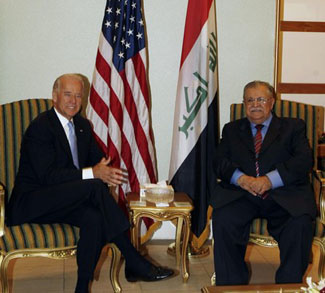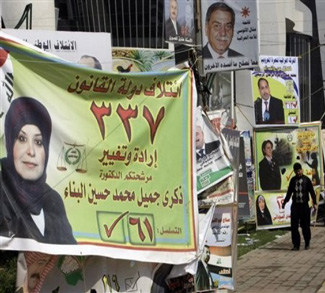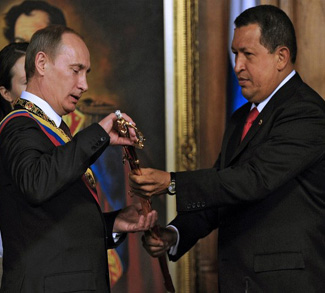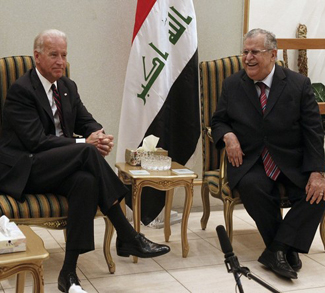FORECAST
Iraq’s political stalemate continues to jeopardize its long-term security outlook.
It has been four months since Iraq held parliamentary elections and political parties remain in a deadlock over who will form a new government. Without a central government tackling the pressing issues that Iraq faces over the next few years- mainly a timetable for the withdrawal of American troops, a national census, and sectarian reconciliation- the security situation in Iraq has once again begun to regress.
The political stalemate in Baghdad has laid to bare sectarian divisions in Iraqi society; divisions that still threaten post-war political infrastructure and Iraqi democracy. There are two men at the center of the impasse: Iyad Allawi, who enjoys the support of Sunni parties, and current Prime Minister Nouri Maliki, who is backed by the country’s Shiite majority. Rumors have swirled that a spike in political assassinations targeted at Allawi’s party is actually an intimidation campaign being directed by elements of the current government. According to NY Times sources, suspicion is rife that Prime Minister Maliki is trying to induce elements of the Allawi coalition to defect for fear of their own safety. Whatever the motivation behind the killings actually is, the fact remains that over 150 Sunni politicians and civil servants have been assassinated since the March elections.
With so much uncertainty at the center of Iraqi politics, questions will once again be raised over whether a quick US withdrawal is the most prudent course of action. Currently, US forces are scheduled to end combat operations in August, but any amendment to the Status of Forces Agreement (SOFA) is impossible while Iraq lacks a functioning central government.
Over the short term, the August deadline will come and go and President Obama will surely relish the opportunity to stress the importance of an end to combat operations in Iraq. US troops will be reduced to 50,000 on schedule as materials and resources are transferred to the Afghan theatre. After all, the August deadline is a soft one insofar that ‘an end to combat operations’ doesn’t necessarily mean that US forces will cease operations aimed at hunting down insurgents in Iraq.
The more interesting deadline is 2011, when American forces are scheduled to be completely withdrawn from the country. This deadline will likely be extended when the political impasse in Baghdad is broken, for the security situation in Iraq- though far better than that of Afghanistan- is still tenuous enough to warrant fear of widespread sectarian conflict or even civil war.
This fear is not driven by spiking suicide bombings or attacks against US troops. Going by the number of attacks, the danger has notably tapered off from the height of open sectarian conflict. Instead, it emanates from the fact that Iraqi democracy and political institutions have still not gained enough traction to peacefully resolve conflicts between feuding groups in Iraqi society. American observers are well aware that as long as the political process remains log-jammed and MPs fear for their lives, the only thing holding Iraq together is the security blanket of a US military presence.
SUMMARY OF EVENTS: June 28th – July 5th, 2010
NORTH AMERICA
United States
A giant tanker refitted to scoop up spilled oil is being tested at the site of the Gulf of Mexico oil leak.
The US government on Wednesday announced a 5.2 million dollar fine against BP’s US subsidiary for making “false, inaccurate or misleading” reports about its energy production on Native American land.
Mexico
The killing of a candidate tipped to become a state governor in Mexico has spiked tensions as election-related violence reached a peak unseen for more than a decade.
With Mexico’s left divided and Calderon sinking in opinion polls, the PRI is eyeing a return to national power in 2012, two terms after PAN ended its 71-year rule in 2000.
LATIN AMERICA
Brazil
The British government is subsidising one of the world’s largest and riskiest oil-drilling projects in the Atlantic Ocean and would be liable for tens of millions of pounds if a major accident took place.
Panama
Panama’s ex-dictator Manuel Noriega on Tuesday dismissed charges of laundering drug money as an “imaginary banking scheme” concocted by the United States as he took the stand in a French court.
The trial of Manuel Noriega on money-laundering charges began in Paris on Monday with lawyers for the ex-Panamanian dictator arguing the proceedings were unlawful and he should be allowed to return home.
WESTERN EUROPE
Greece
Clashes have broken out between demonstrators and police at a protest against government spending cuts in Athens, the Greek capital.
Germany
A first vote has taken place to elect a new German president – but has proved inconclusive.
EASTERN EUROPE & RUSSIA
Russia
US authorities have detained ten people on charges of carrying out espionage activities in the United States for Russia, a Justice Department report says.
Moscow has played down the arrest of alleged Russian spies in the US, saying the issue would “not negatively affect relations”
The Russian espionage drama intensfied tonight as one of the suspects in the alleged “deep cover” spy ring failed to answer bail.
MIDDLE EAST
Iran
Iran has handed over new documents proving one of its nuclear scientists was abducted by the US, Tehran says.
Israel
In the wake of last month’s deadly raid on the Gaza-bound protest flotilla, Israelis and Palestinians alike are increasingly doubtful that a Palestinian state can be achieved, according to a joint Israeli-Palestinian poll released on Tuesday.
Iraq
Officials call for calm and patience as Iraqi citizens’ fury at power outages boils over.
Clashes between Turkish troops and Kurdish rebels in southeast Turkey intensified on Friday after Turkish planes bombed Kurdish rebel targets in northern Iraq.
UAE
Scores of shipments of illegal weapons-building material have been intercepted and companies involved in the illicit nuclear trade shut down in a crackdown in Dubai and other parts of the United Arab Emirates.
Lebanon
Lebanon’s top Shia Muslim cleric, seen as a key figure in the founding of militant group Hezbollah, has died at the age of 74.
EAST ASIA
China
Security is tight in Urumqi in China’s Xinjiang region ahead of the first anniversary of deadly ethnic riots.
China denied on Tuesday media reports that an artillery drill in the East China Sea was in response to a planned military exercise between South Korea and the United States.
China and Taiwan have signed a historic trade pact, seen as the most significant agreement since civil war split the two governments 60 years ago.
SOUTH ASIA
Afghanistan
Calling the protection of his troops a “moral imperative,” Gen. David H. Petraeus said Tuesday that he would closely review restrictions on United States airstrikes and artillery in Afghanistan, which have cut down on civilian casualties but have been bitterly criticized by American troops who say they have made the fight more dangerous.
Insurgents have attacked Nato forces in eastern Afghanistan.
Afghan president Hamid Karzai has reportedly met with the Taliban’s most senior commander Serja-eddin Haggani in Kabul as UK calls for peace with the militants.
AFRICA
Nigeria
an affiliate of US oil firm ExxonMobil confirmed another oil spill at its Qua Iboe oil fields in Akwa Ibom state fishermen and several communities affected by the spill have continued to express their disgust and anguish over what they term as cessation of their economic livelihood.




